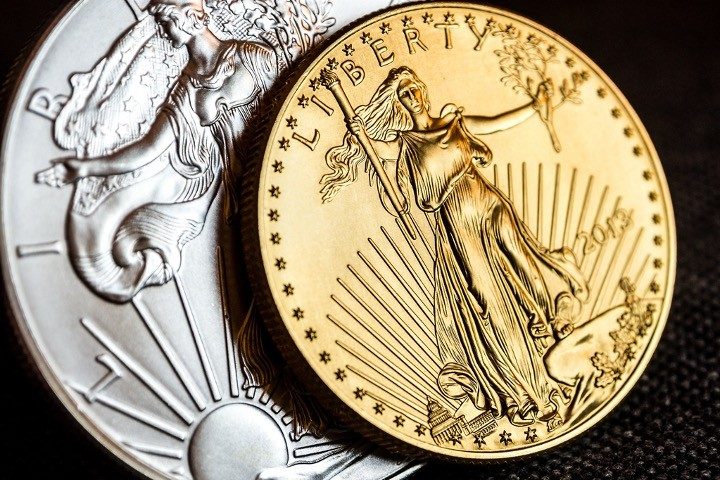
A bipartisan vote in the Wyoming state Senate approved a measure authorizing the Wyoming state treasurer to hold gold and silver specie to protect the state, as well as to set up a process whereby certain tax payments can be made with gold and silver.
Mises Wire reports:
Introduced by Senator Bob Ide (R-Casper), SF 101 amends and further implements the Wyoming Legal Tender Act, a popular 2018 law that had removed all tax liability from gold and silver transactions and affirmed that the monetary metals are legal tender in Wyoming.
Senate File 101 prompts the Wyoming state treasurer to create a formal system to deal directly in constitutional money — a system that would also include holding gold as an asset to help the Cowboy State hedge against its high exposure to Federal Reserve note dollars and potentially invest in precious metals leases and bonds.
The Department of Revenue could receive mineral tax payments denominated in specie, i.e. gold and/or silver. And in executing its duties, the state treasurer could hire precious metals firms that are experts in receiving, authenticating, exchanging, and storing gold and silver….
By creating a mechanism which enables Wyoming to receive tax payments — or to potentially make payments — in gold and silver, the Cowboy State would establish an alternative unit of payment in the face of a Federal Reserve note that continues to be devalued.
Wyoming should be congratulated for taking steps to disgorge from the Federal Reserve its monopoly control over the currency, and thus over the financial health of citizens of the Cowboy State.
By placing the lion’s share of the blame squarely at the feet of the federal government, particularly its unrepentant, unchecked, and (most importantly) unconstitutional manipulation of the monetary system of the United States through the creation and perpetuation of the Federal Reserve system, bills to restore the value of sound money reassert the sovereignty of the states and re-enshrine the 10th Amendment to the Constitution wherein the Founding Fathers intended to erect an impregnable barricade, one that would protect the people from the usurpations they knew would be attempted by the general government.
In 2011, then-Chairman of the Federal Reserve Ben Bernanke weighed in on the issue of restoring gold and silver as legal currency. “You need to be attentive to where the economy is and not move too quickly to reverse the policies that are helping the recovery,” Bernanke said, apparently without being purposefully facetious.
The only hope of a recovery lies where hope for liberty has always lain: with the people and the states.
If any state authorizes gold and silver as an alternative to Federal Reserve notes, economists say, the economy of such a state would stabilize and increase. A happy side effect of such a system would be the weakening of Federal Reserve notes and a strengthening of the appeal of gold and silver.
This genuine recovery (as opposed to the “boom and bust” pseudo-recoveries espoused by Bernanke) would obliterate the fiat-money monopoly exercised by the Federal Reserve. The history of that monstrosity was described most ably in G. Edward Griffin’s The Creature From Jekyll Island. Griffin writes:
The American Heritage Dictionary defines fiat money as “paper money decreed legal tender, not backed by gold or silver.” The two characteristics of fiat money, therefore, are (1) it does not represent anything of intrinsic value and (2) it is decreed legal tender. Legal tender simply means that there is a law requiring everyone to accept the currency in commerce. The two always go together because, since the money really is worthless, it soon would be rejected by the public in favor of a more reliable medium of exchange, such as gold or silver coin.
And that is the key to restoring fiscal soundness to the once-enviable economy of the United States.
Of course, despite the obvious benefits of a return to sound money, the federal government will not sit idly by and watch its monopoly be rendered irrelevant by state governments. In a host of issues, the plutocrats on the Potomac have demonstrated that they will go to any length to maintain their monolithic economic status.
There is one aspect of such statutory efforts to restore the power of sound money that is rarely reported: Article I, Section 10 of the U.S. Constitution.
That section reads in relevant part:
“No State shall … make any Thing but gold and silver Coin a Tender in Payment of Debts….”
So, if a state accepts Federal Reserve fiat money as legal tender, isn’t that a direct violation of the black letter of the Constitution?
Should states need to pass resolutions enforcing Article I, Section 10 given that acceptance of Article I, Section 10 was a condition of ratifying the Constitution and joining the union?
No.
Alas, a knowledge and understanding of the U.S. Constitution is not exactly something that lawmakers — state or federal — are known for, which is concerning considering that both groups are bound by oath to support the Constitution.
Despite being unnecessary, the redundancy of passing resolutions to restore sound money in the states does serve to remind the people, the federal government, and the Federal Reserve that there are state legislators who will not stop fighting to see their states adhere to the mandates of Article I, Section 10.
The key to restoring sound money in the manner prescribed by the Constitution is for the people to call on Congress to abolish the Federal Reserve and to elect state legislators (all of whom take an oath to “support the Constitution”) committed to busting up the Fed’s fiat-money monopoly by enacting pro-gold and silver bills such as Wyoming’s SF 101.
Currently, there are several other states considering similar sound money bills, including Alaska, Missouri, Mississippi, South Carolina, and Tennessee.
After passing the Senate, SF 101 now heads to the Wyoming House for further consideration.



